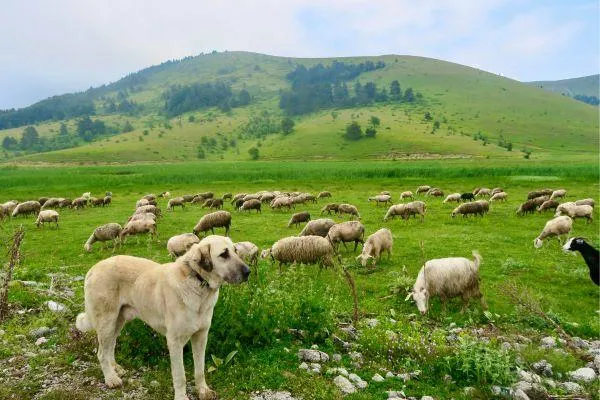
Sheep Measles: What Every Dog Owner on a Farm Should Know
If you have a dog and spend time on sheep farms, whether as a landowner, visitor, hunter, or holidaymaker, it’s worth knowing about sheep measles. This common but preventable condition has no impact on human health, but it does affect meat quality and can cause serious financial loss for farmers.
Understanding how it spreads, and how to stop it, is key to protecting both flocks and your good relationship with the farming community.
What is sheep measles?
Sheep measles, caused by Taenia ovis, is a parasitic disease that affects sheep. The infection doesn’t make sheep sick, but it causes cysts in the meat, which means affected carcasses are downgraded or even rejected at processing plants.
The parasite needs two hosts to complete its lifecycle: dogs and sheep. Here’s how it works:
A dog eats raw sheep meat or offal containing cysts.
The dog becomes infected and starts shedding tapeworm eggs in its faeces.
These eggs land on pasture, where they can survive for up to six months.
Sheep graze the contaminated pasture and become infected.
The cycle starts again when another dog eats infected meat.
Dogs are the only way this parasite can spread. That means by managing how dogs are fed, treated, and moved through sheep areas, we can stop the cycle.
Monthly worming: a simple and effective step
The most important thing you can do is worm your dog every 30 days with a product that contains praziquantel. This is the only wormer that kills the tapeworm responsible for sheep measles. Products that do not contain praziquantel will not prevent the disease.
Even if your dog is well-fed and never chases stock, it could still be at risk if it eats scraps, scavenges, or is given raw meat. Homekill meat must always be thoroughly cooked or frozen for at least 7 days before being fed to dogs.
Managing access to reduce risk
Sheep measles can be introduced to a farm when infected dogs use high-traffic areas such as riverbanks, huts, or access tracks. On lifestyle blocks and farms where public access is permitted, a few simple steps can help:
Fence off high-risk areas such as deadstock pits, paddocks close to water access points, or well-used tracks
Use signage to let people know that dogs must be dosed and kept away from stock
Talk to visitors and neighbours, especially during duck shooting season or holidays
Fencing does not need to be complex. A basic barrier is often enough to signal that dogs should be kept out. Combine that with a polite sign and most people will do the right thing.
Be a good neighbour
Even if you don’t keep sheep yourself, regularly worming your dog is still important. The eggs that cause sheep measles can be spread anywhere your dog defecates, including tracks, road verges, and paddocks on neighbouring farms. Dosing your dog and being mindful of where it goes is part of being a responsible dog owner and a good rural neighbour. It helps protect the wider farming community and keeps access open for everyone.
A shared responsibility
Sheep measles is not anyone’s fault, but it is something we can all help prevent. If you’re a dog owner spending time on or near sheep farms, monthly worming and a few practical steps will make a difference. If you’re a landowner, having a clear access policy and talking to visitors can help protect your flock and your income.
This is about looking after the land, the animals, and each other. If you found this article useful, please share it with others who might not be aware of the issue.

